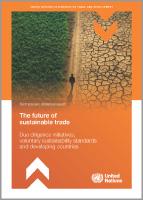
The governance of sustainable trade is undergoing a major transformation. New due diligence measures are placing stricter requirements on businesses to ensure their supply chains do not harm people or the planet. These legally binding rules require companies to identify risks, take steps to prevent issues like deforestation or labor exploitation, and demonstrate compliance through audits and reporting.
While these measures aim to make trade more ethical and sustainable, they pose significant challenges for small producers and exporters in developing countries. Without the resources needed to meet these requirements, many risk losing access to global markets.
This report examines this regulatory transformation, focusing on the intersection between voluntary sustainability standards (VSS) and emerging due diligence requirements. It serves as a guide for policymakers, businesses and researchers navigating the evolving landscape of sustainable trade. By understanding and addressing the challenges of this shift, stakeholders can help shape a trade system that balances sustainability goals with inclusive economic growth.
Key Points
- The rise of mandatory due diligence. Governments worldwide are increasingly adopting legally binding due diligence requirements. For instance, the European Union’s Corporate Sustainability Due Diligence Directive requires companies to assess and mitigate risks like deforestation and forced labor in their supply chains.
- The critical role of VSS. Voluntary sustainability standards like Fairtrade and Rainforest Alliance align closely with sustainability goals and are adapting to support compliance with new regulations. For example, the Rainforest Alliance’s geolocation tools help businesses track deforestation risks, supporting compliance with EU directives.
- Impacts on developing countries. Due diligence measures could exclude small producers who lack the resources to meet stringent requirements. For example, the report highlights how in Peru producers of commodities like cocoa face challenges from certification schemes, underscoring the need for supportive measures.
- Lessons from VSS for due diligence. The six-step due diligence framework closely aligns with processes used by VSS. This alignment creates opportunities for policymakers to leverage existing systems, such as Fairtrade’s audit mechanisms, to streamline due diligence implementation.
- Recommendations for inclusivity. To ensure sustainable trade governance benefits all, the report calls for harmonizing regulations, increasing producer participation and providing financial support for small producers. UN Trade and Development (UNCTAD) advocates for fair value distribution along global value chains and capacity-building programs tailored to vulnerable actors.


